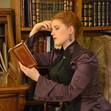Nerds of a Feather Spock Together.
I crack myself up.
Anyway.
I was confronted the other day with the inescapable fact that someone whom I take very seriously was unaware that I had any interest whatsoever in science fiction. That worries me a little, considering that the bulk of my works-in-progress falls to one degree or another under that genre. (My plan is to have The Siren out some time this year. I call it scifi-lite, and some people have asked me whether or not it might actually be urban fantasy, but they hadn’t read the ending yet.) But in going back over my blog posts and general internet presence, I realize that I really don’t talk about science fiction.
That’s a problem, since – as indicated above – nerds of a feather must Spock together, and it’s hard for nerds of my feather to find me if I’m wearing my fantasy-camo.
So, allow me to present a short history of one of my obsessions:
I always had a kind of peripheral awareness of scifi, thanks to Sherlock Holmes in the 22nd Century and the Wishbone covers of The Time Machine and Journey to the Center of the Earth. I vaguely recall seeing Flight of the Navigator once in second grade or so. Zenon – Girl of the 21st Century briefly captured my imagination, but that didn’t last long. Other than The Norby Chronicles and Enchantress from the Stars, I don’t recall ever reading scifi before the sixth grade.
Sixth grade was the turning point.
Sixth grade was the year I changed towns, changed schools, and realized that I was a lot worse at making friends than I had thought. In Houston, there were enough similarly weird kids that I could be ignored as part of an untouchable nerd caste. In Huntsville, the weird kid attracts attention. It was the first time anyone had ever tried to convert me, and it was unnerving.
It only took me a week or two to fall in with Davis – who later became the best friend I’ve ever had. Davis was a kindred spirit. He was also a Trekkie. Ignorant of the multitude variations of Star Trek, I went home and watched countless episodes of Voyager so that we would have something to talk about. (I found out later that Next Generation was something entirely different.) Then I drew Borg-esque characters, aliens, and space-rebel types.
It was only after surviving the Voyager series finale that I realized what I had found. I had started out my literary career as a die-hard fantasy buff. I read The Lord of the Rings (reluctantly, I admit), and The Unicorns of Balinor (with considerably more enthusiasm) and Dealing with Dragons (which introduced me to sassy protagonists). I loved fantasy as a vision of what could be, in a different world. What I found in scifi was different. Scifi is what could be within the confines of our own universe. It can serve as both a warning and a hope. Like fantasy, it expresses truths through a vehicle of the fantastic, but for me, it hits so much closer to the core of our anxieties, especially in this era of rampaging progress. It explores problems that may well arise within the next decade or century or couple of centuries, presents us with options we may not be able to consider at the eleventh hour. Through scifi, we can project our future and cope with its difficulties before they pin us down.
I moved from Star Trek the television series to Star Trek the literature. (I subscribed to the fabricated rivalry between Star Trek and Star Wars until well into high school). There are a surprising number of Star Trek books. I owned more than fifty of them and barely scratched the surface. I picked up Ender’s Game and The Hyperion Cantos at a library’s too-beat-up-to-keep sale. They grabbed me. I stayed up way later than my parents would have liked, one night, and saw the Stargate movie on late-night cable. I wrote ten thousand words the next day. I can’t describe how thrilled I was to discover the television series. My great-grandmother gave me Easton Press copies of 20,000 Leagues Under the Sea and The Time Machine. I read them conspicuously, because I felt really hot when I was reading from gilt pages. I started picking up UFO conspiracy theory books to get ideas for my own stories. Then I discovered The X-Files and figured out that most of my ideas had already been done. (The file is still sitting on a floppy disc, somewhere.) I ate up Firefly, Battlestar Galactica, and Farscape. Mid-high school, I caught an episode of Doctor Who and spent the next twelve weekends or so catching up on forty years of British scifi wonder. I knitted myself a fifteen-foot scarf.
It was purple.
High school also got me into steampunk. I had always been into the Victorian aesthetic, especially as it connected to Sherlock Holmes and HG Wells, but it never occurred to me that there was a name attached to its speculative side.
College found me the outrageously awesome Overview of Science Fiction course, taught by this amazingly awesome person. She introduced me to Connie Willis and Neal Stephenson. This was also about the time that I found William Gibson.
It’s been a while since I last got into something new. Most recently, it’s been Warehouse 13.
And so, when I start pestering people to buy copies of The Siren, you’ll know where I’m coming from.
Nerds of my feather, join my flock.





